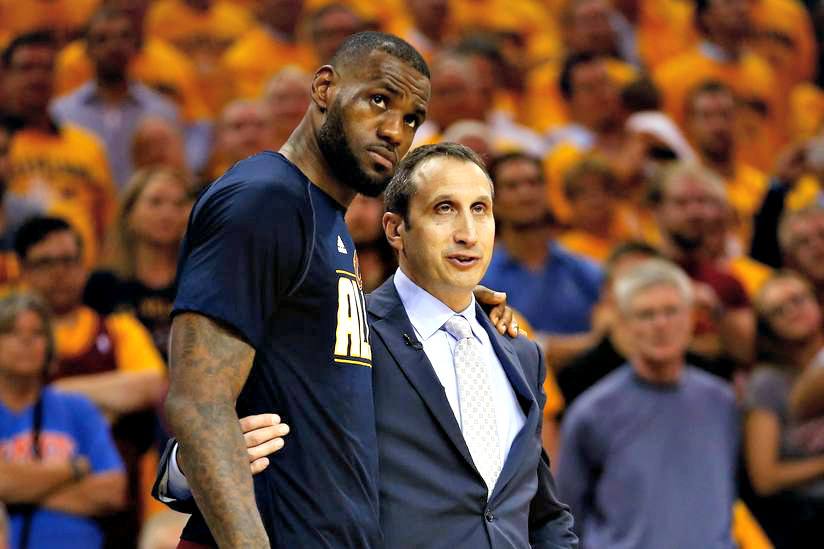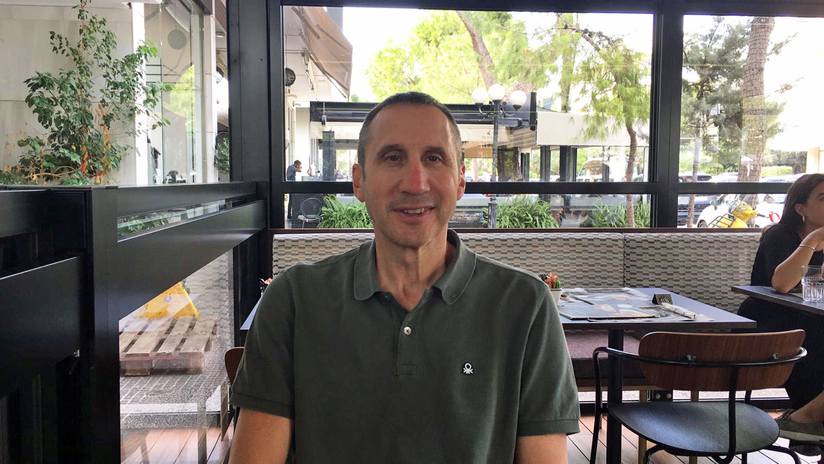
David Blatt opens up about his battle with MS
'Life throws different things at you, and no one guarantees you anything,' said the legendary Israeli basketball coach.
For the first time in his life, David Blatt doesn’t have a game plan.
The Boston native has played basketball for as long as he can remember. As a kid, he listened to the games of his beloved Celtics on the radio and idolized the legendary Bill Russell. As a teenager, after school each day, he perfected the art of the dribble in countless hours of practice. He used those skills as a point guard, first as captain of the Princeton University basketball team and later in a decade of professional play in Israel. He eventually went on to a highly regarded career as a coach. He participated in two Olympics. He took Maccabi Tel Aviv to the EuroLeague championships and was named Coach of the Year. He led LeBron James and the Cleveland Cavaliers to the NBA Finals.

But all of that was thrown into upheaval this August when Blatt resigned as head coach of the Greek Olympiacos team. He revealed that he had multiple sclerosis and could no longer adhere to the rigors of coaching, a lifestyle of constant movement and travel. MS, as it is more commonly known, is a disease in which a person’s immune system thinks their own body is a foreign substance and begins to destroy it. MS patients often experience a stiffness in their muscles, making it hard to move. Many end up in wheelchairs. It is a degenerative disease, which means patients get progressively worse over their lifetimes. There are treatments to slow it down, but there is not yet a cure.
Blatt realized something was wrong in the summer of 2018. “I was a former player and, like many people, I suffered with some back difficulties,” he told From The Grapevine from his home in Greece. “According to the orthopedist that I was seeing, my spine was a train wreck and required surgery that hopefully would improve the symptoms that I was having.” But that operation and subsequent physical rehab didn’t offer relief. “If anything, I found that I was even worse, and that was disturbing. Over time, I just realized that perhaps it was something different, or something in addition to that.”
A neurologist eventually gave him the diagnosis he was dreading. He had primary progressive multiple sclerosis (PPMS), which affects about 10%-20% of MS patients, and offers no remission after the initial symptoms. “PPMS has one good thing and one bad thing,” explained Dr. Dimitrios Karussis, the director of the Multiple Sclerosis Center at Hadassah Hospital in Jerusalem. “The good thing is that the disease usually appears at a later age and it progresses very slowly. It’s not like a fast progression we see with other types of MS. However, the disadvantage of this type of disease is it affects many of the motor pathways, so it significantly affects walking and motor ability from the onset.”
Blatt, a man who proved himself as always being able to see several moves ahead, was now left directionless. “At first, it’s obviously disturbing and frightening because, like most MS patients, you don’t really know what it is. It’s not altogether easy to digest at first,” he revealed. But he mustered the strength to approach his new illness like a coach: tactical and strategic. “My first thought was, of course, to educate myself and to become more educated on what I was dealing with. Then look for ways that I could No. 1, deal with it, and No. 2, move forward with the necessary steps and possible treatments that I could go through.”

The treatment, which he’s now receiving in Greece, is a regular infusion of a drug called Ocrevus. It’s administered intravenously over the course of five hours, which gives Blatt plenty of time to think. “Even at 60 years old, I still was a very active person. Athletics was a very big part of my life – both in terms of my own personal regimen, and in terms of the profession that I worked in.” As of late, he’s been experiencing leg weakness and balance issues. “It’s been a pretty big adjustment for me for sure.”
Tal Brody, the Magic Johnson of Israeli basketball and an ambassador for the country and the sport, has taken a keen interest in Blatt’s journey. “I have followed David’s career ever since he moved to Israel in 1981,” Brody told us. “David was always a master in reacting to changes, and he will continue to master this new health situation and continue to be an asset in whatever he chooses to do – whether it’s coaching, business, representing or mentoring others.”
Indeed, Blatt said he’s already started taking steps in that direction. “I hope that I can use this particular condition as a means of helping other people and perhaps inspiring others that have different kinds of disabilities, not only MS, but other things that affect their day-to-day life or their health,” he said. “The fact that I’m a known personality and someone that perhaps can offer some support to other people – that’s a very, very positive thing in my mind. I hope to take advantage of that for others.”
Meanwhile, the father of four has not strayed too far from the sport he loves. Since retiring from his latest coaching position, he is enjoying watching his son Tamir play professional basketball in Israel, where the 22-year-old is a starter on the national team. “Part of the joy that I plan to take moving into the next phase in my career, is that I’ll be able to spend more time watching him,” Blatt said as he pulled up video clips on his phone of his son sinking three-pointers. “He’s a terrific player and a terrific kid.” Like his dad, he plays point guard.
As Blatt knows better than anyone, the game is not over until the blast from the final buzzer. In 2014, he coached the Maccabi Tel Aviv team to one of the greatest comebacks against CSKA Moscow in the EuroLeague semifinal game, and then proceeded to win the championship after defeating Real Madrid in overtime. He’s taking those same lessons into the next chapter of his story.
“Life throws different things at you, and no one guarantees you anything,” he told us. “The question is what do you do with the cards that you’re dealt, or the situations that you’re in. How do you turn that into a positive, or into a way that can, at the very least, help others? That way there’s certainly some reward in all of this, and that’s the way I’m looking to take it.”
An article from: fromthegrapevine.com
Main photo: David Blatt took the Cavaliers to the NBA Finals in his first year at Cleveland. (Photo: Ezra Shaw / Getty Images)
